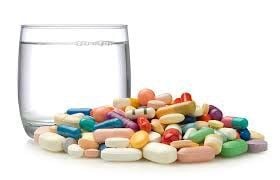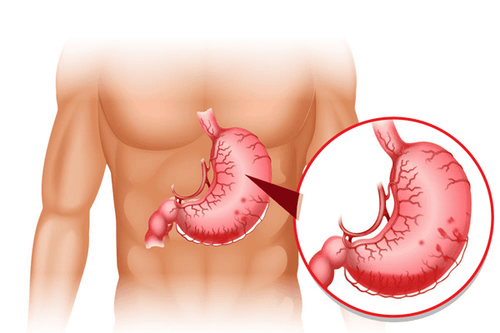This is an automatically translated article.
The article is professionally consulted by resident doctor Duong Van Sy - Department of Pediatrics - Neonatology - Vinmec Hai Phong International General Hospital.
Gastroesophageal reflux is a common occurrence in infants. Why babies and young children often have acid reflux, does this phenomenon need intervention, let's find out through the article below.
1. What is Gastroesophageal Reflux?
Gastroesophageal reflux in infants and young children occurs when the contents of the stomach return to the mouth and cause the child to vomit (regurgitate) out. Also known as gastroesophageal reflux (GER), acid reflux is rarely a serious condition and will go away on its own as the child gets older, however if the child is older than 18 months and still suffering is abnormal.
Reflux can occur several times a day in healthy children. If the child is completely normal, eats, sleeps, plays and develops well, the reflux is nothing to worry about.
Gastroesophageal reflux, although rare, can still be a sign of a medical condition, such as allergies, gastrointestinal disturbances, or gastroesophageal reflux disease (GERD).
2. Symptoms of GERD in infants and children
Gastroesophageal reflux in infants and young children is usually nothing to worry about, because the amount of stomach acid at this age is not enough to irritate the pharynx or esophagus, and therefore will not cause signs or symptoms. any.
Take your child to the doctor if:
The child is not gaining weight. The child is constantly vomiting, that is, vomiting with force, vomiting everything. The child vomits fluid that is green or yellow. The child vomits blood or vomit that is the color of coffee. Children stop eating. Baby stools with blood. The child has difficulty breathing or has a persistent cough New regurgitation occurs in children 6 months of age and older. Children are fussy, unusually uncomfortable after eating. Some of these symptoms can be signs of a serious (but treatable) medical condition, such as gastroesophageal reflux disease or gastrointestinal obstruction.
3. Causes of gastroesophageal reflux in infants and children
In infants and young children, the muscle ring at the junction between the esophagus and the stomach - the lower esophageal sphincter (LES) is immature (not fully developed). That allows food to go back up into the mouth. When the lower esophageal sphincter is mature enough, it opens only when the child swallows and remains tightly closed the rest of the time, ending reflux. In fact, gastroesophageal reflux in infants and children Infancy is extremely common and almost impossible to prevent, because of the following factors:Babies stay lying down for most of the day.

The diet is almost entirely liquid. Premature babies, premature babies. In some cases, gastroesophageal reflux in infants and young children is caused by more serious causes, such as:
Gastroesophageal reflux disease: in this pathology, the reflux component there is enough acid to irritate and damage the lining of the esophagus. pyloric stenosis: the junction between the stomach and duodenum is narrowed, making it difficult for the stomach to push food through the intestines. Feed intolerance: The protein component of cow's milk is the most common cause of irritation. Eosinophilic esophagitis: a type of white blood cell (eosinophils) increases in number and damages the lining of the esophagus.
4. Complications of GERD in infants and children
Gastroesophageal reflux in infants and young children usually goes away on its own without causing any problems.If the child has a more serious condition, such as gastroesophageal reflux disease, the child may show signs of developmental delay. Some studies have shown that if young children frequently spit up, the condition is more likely to develop gastroesophageal reflux disease in adulthood.
5. Diagnosis of gastroesophageal reflux in infants and young children
The doctor will ask the parents about the child's symptoms and conduct a clinical examination. If the child is healthy, growing steadily, and meeting standards, further tests are usually not needed.
In case need further examination, the doctor may order the following techniques and tests:
Ultrasound: this method helps to detect pyloric stenosis in children. Blood and urine tests: Blood and urine tests can help direct or identify the causes of recurrent vomiting and delayed weight gain. Esophageal pH measurement: To measure the acid level in a child's esophagus, the doctor will insert a small tube into the child's esophagus through the mouth or nose. This tube is connected to an acid meter. Your child may need to be hospitalized to prepare for this technique. X-ray: The images obtained after an X-ray can help detect abnormalities in the digestive tract, such as a blockage of the digestive tract. Your child may need to take a contrast medium (barium) before taking an X-ray. Upper gastrointestinal endoscopy: a flexible endoscope (equipped with a camera and light source) is passed from the mouth down the child's esophagus, stomach, and first colon. During the procedure, your doctor may take tissue samples for testing. For young children, upper gastrointestinal endoscopy is usually done after anesthesia.
6. Methods of treating gastroesophageal reflux in infants and children
Gastroesophageal reflux in infants and young children will usually go away on its own, but to reduce reflux your doctor may recommend:Give your child several meals, each meal in a smaller amount. Pause between meals to let your baby burp. Keep the child in an upright position for 20-30 minutes after eating. Eliminate dairy products, beef or eggs from a nursing mother's diet, to check for any allergies the baby has. If your baby is on formula, try changing the formula. Change the nipple size of the bottle to suit the baby.

6.1 Medicines Use of drugs for GERD in infants and young children is not recommended, except in cases of complicated reflux, because the drug can interfere with iron and calcium absorption, leading to an increased risk of some respiratory and gastrointestinal infections.
Acid-reducing drugs can be used for a short time if the child:
Growth retardation. Not eat. There is evidence of esophagitis. Chronic asthma. 6.2 Surgery Surgery is rarely needed to resolve GERD in infants and young children, unless the reflux is so severe that it does not grow or affects the child's breathing.
Pediatrics department at Vinmec International General Hospital system is the address for receiving and examining diseases that infants and young children are susceptible to: viral fever, bacterial fever, otitis media, pneumonia in children, .... With modern equipment, sterile space, minimizing the impact as well as the risk of disease spread. Along with that is the dedication from experienced doctors who specialize in pediatric patients, making the examination no longer a concern for parents.
Please dial HOTLINE for more information or register for an appointment HERE. Download MyVinmec app to make appointments faster and to manage your bookings easily.
Article referenced source: mayoclinic.org













